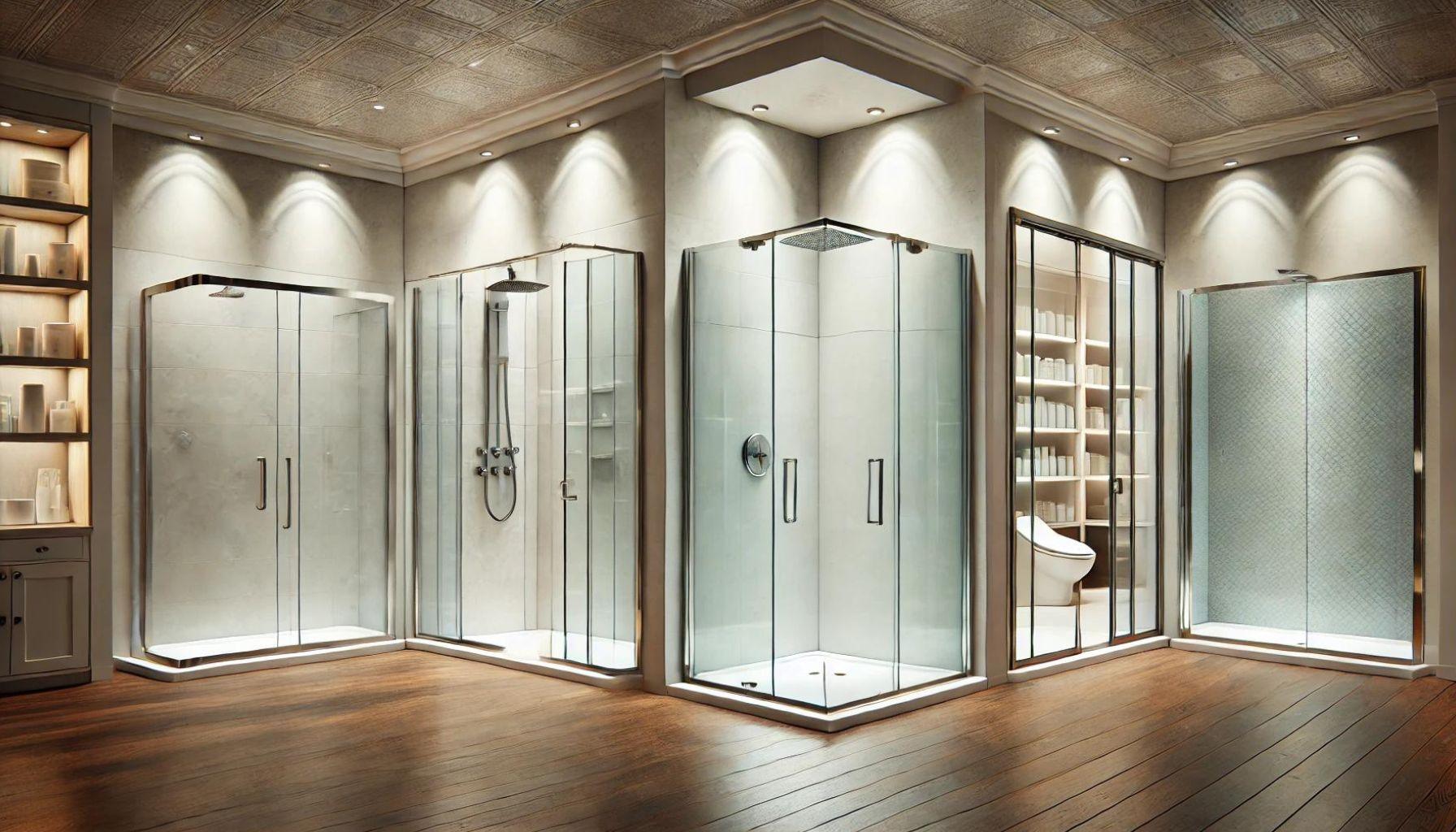Choosing the right shower door is a crucial decision that can significantly impact the overall look, functionality, and value of your bathroom. A well-selected shower door not only enhances the aesthetic appeal of your space but also plays a vital role in ensuring your comfort and convenience during daily use.
The shower door serves as a focal point in your bathroom, setting the tone for the entire room's ambiance. Whether you prefer a sleek and modern look or a more traditional and classic style, the right shower door can complement and elevate the overall design. Additionally, the shower door contributes to the perceived spaciousness and openness of the bathroom, making it an essential consideration for both small and large spaces.
Beyond aesthetics, the functionality of your shower door is equally important. A properly fitted and installed shower door can prevent water leakage, ensuring a dry and safe environment outside the shower area. It also contributes to energy efficiency by retaining heat and moisture within the shower enclosure, reducing the need for excessive heating and ventilation.
Moreover, the right shower door can enhance accessibility and safety, particularly for those with mobility challenges or special needs. Features such as low-threshold entries, wider openings, and grab bars can make the shower experience more comfortable and secure for all users.
With a wide range of options available in the market, from traditional framed doors to sleek frameless designs, choosing the right shower door can be a daunting task. This comprehensive guide will help you navigate through the various factors to consider, ensuring that you make an informed decision that not only meets your functional requirements but also aligns with your personal style and preferences.
Types of Shower Doors
Shower doors are an essential component of bathroom design, offering both functional and aesthetic benefits. The selection of a shower door can dramatically influence the overall feel and functionality of your bathroom. Factors such as the size of the space, your personal style preferences, and budget considerations play pivotal roles in determining the right type for your setup. Below, we delve into the various styles of shower doors, each designed to cater to different needs and tastes.
1. Sliding Shower Doors
Ideal for compact spaces, sliding shower doors operate on a horizontal track, making them a smart choice for bathrooms where space is at a premium, such as those with combined tub and shower areas. These doors are lauded for their space-saving qualities and ease of operation. However, they do have some drawbacks, including potential for water leaks and the need for frequent cleaning of the track to prevent buildup and ensure smooth operation.
2. Pivot Shower Doors
Pivot doors offer a robust solution, with hinges fixed at one side, allowing the door to swing outward. This design is well-suited for more spacious shower enclosures, providing a wide opening and easy access. Pivot shower doors can lend a contemporary and clean appearance to your bathroom. It's important to note that they require sufficient clearance to operate properly, which might not be feasible in tighter bathroom layouts.
3. Hinged Shower Doors
Exuding a timeless appeal, hinged shower doors swing open much like traditional doors. These doors can be crafted with or without frames, making them adaptable to a wide array of shower dimensions and styles. The primary consideration for hinged doors is the space required for the door’s arc, which must be factored into your bathroom’s layout.
4. Frameless Shower Doors
These doors are distinguished by their lack of a surrounding frame, offering a modern and minimalist aesthetic. Frameless shower doors can make a small bathroom appear larger and more inviting by reducing visual clutter. While they offer a sleek look, they often come at a higher price point and demand precise installation to ensure they are watertight.
5. Neo-Angle Shower Doors
Specifically designed for corner showers, neo-angle doors are a smart solution for optimizing space in smaller bathrooms. These doors can be configured to open via a hinge or pivot, or even slide, depending on your preference and space constraints. Available in both framed and frameless styles, they offer versatility and a contemporary look.
When selecting a shower door, it’s important to consider not just the appearance but also the practical implications of each type. Issues like ease of access, maintenance requirements, and potential for water leakage should influence your decision. Balancing these functional aspects with the aesthetic appeal will help you choose a shower door that not only looks great but also enhances your bathroom’s usability.
Measuring for the Right Shower Door Size
Accurate measurements are crucial when selecting a shower door to ensure a proper fit and seamless installation. Even a slight miscalculation can lead to gaps, leaks, or an ill-fitting door that compromises functionality and aesthetics. Here are some essential tips for measuring your shower area correctly:
- Importance of Accurate Measurements: Precise measurements are vital for determining the appropriate size and style of shower door that will fit your space perfectly. Inaccurate measurements can result in ordering the wrong size, leading to costly replacements or extensive remodeling to accommodate the incorrect door.
- Measuring Techniques: When measuring for a shower door, it's recommended to take multiple measurements at different points to account for any irregularities or variations in the opening. Use a high-quality metal tape measure and measure horizontally across the top, middle, and bottom of the opening, as well as diagonally from corner to corner. Record the smallest measurements to ensure a proper fit.
- Accounting for Openings and Obstructions: Be mindful of any obstructions or protrusions within the shower area, such as pipes, niches, or built-in shelves. These elements can impact the size and style of the shower door you choose. Measure the clearance around these obstructions to ensure the door can open and close properly without interference.
Additionally, consider the direction in which the shower door will open and ensure there is ample space for it to swing freely without hitting any nearby walls, vanities, or fixtures. Measure the distance from the shower opening to any potential obstacles to determine the appropriate door swing.
By following these guidelines and taking accurate measurements, you can confidently select a shower door that fits seamlessly into your bathroom, providing a functional and visually appealing solution.
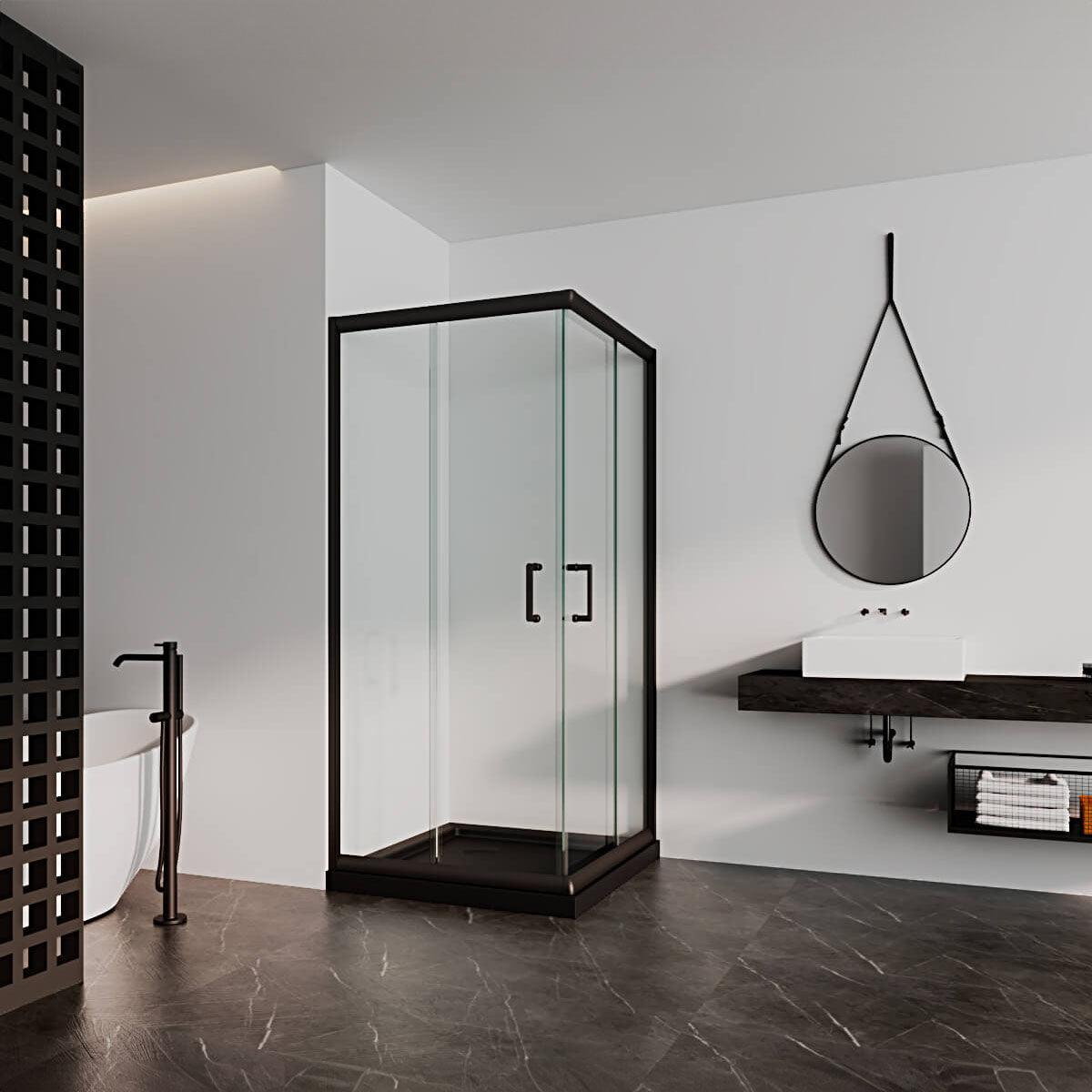
36" x 36" Shower Door Set - Corner Setup with Black Hardware and Black Base
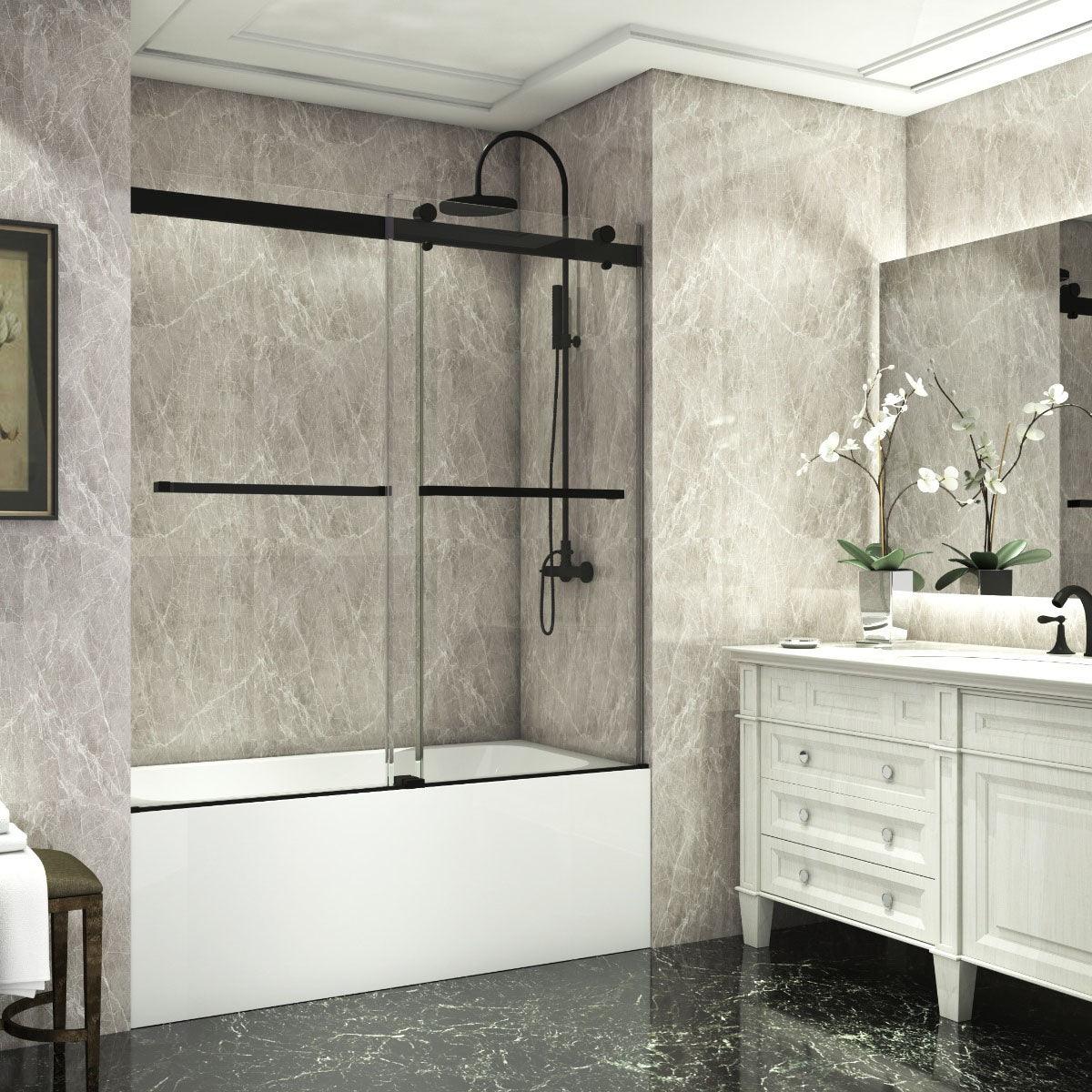
Bathtub Enclosure 60" Glass Doors with Square Black Hardware

60" x 32" Chrome Square Hardware Shower Set - 2 Wall Setup Without Base
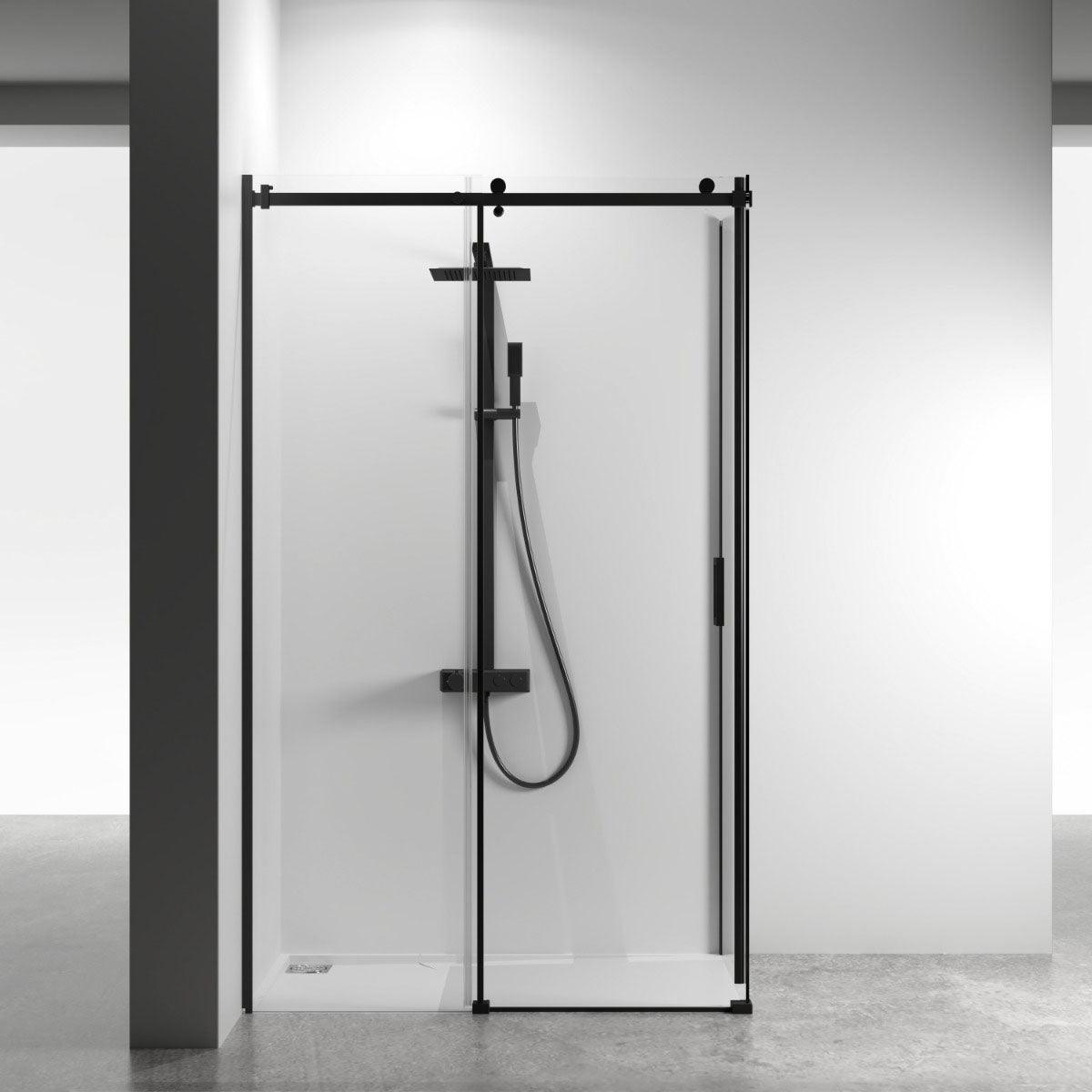
48"Wx 32"D x 79"H x 8mm Reversible Sliding Shower Door Square Design Hardware in Black with 32" Side Panel
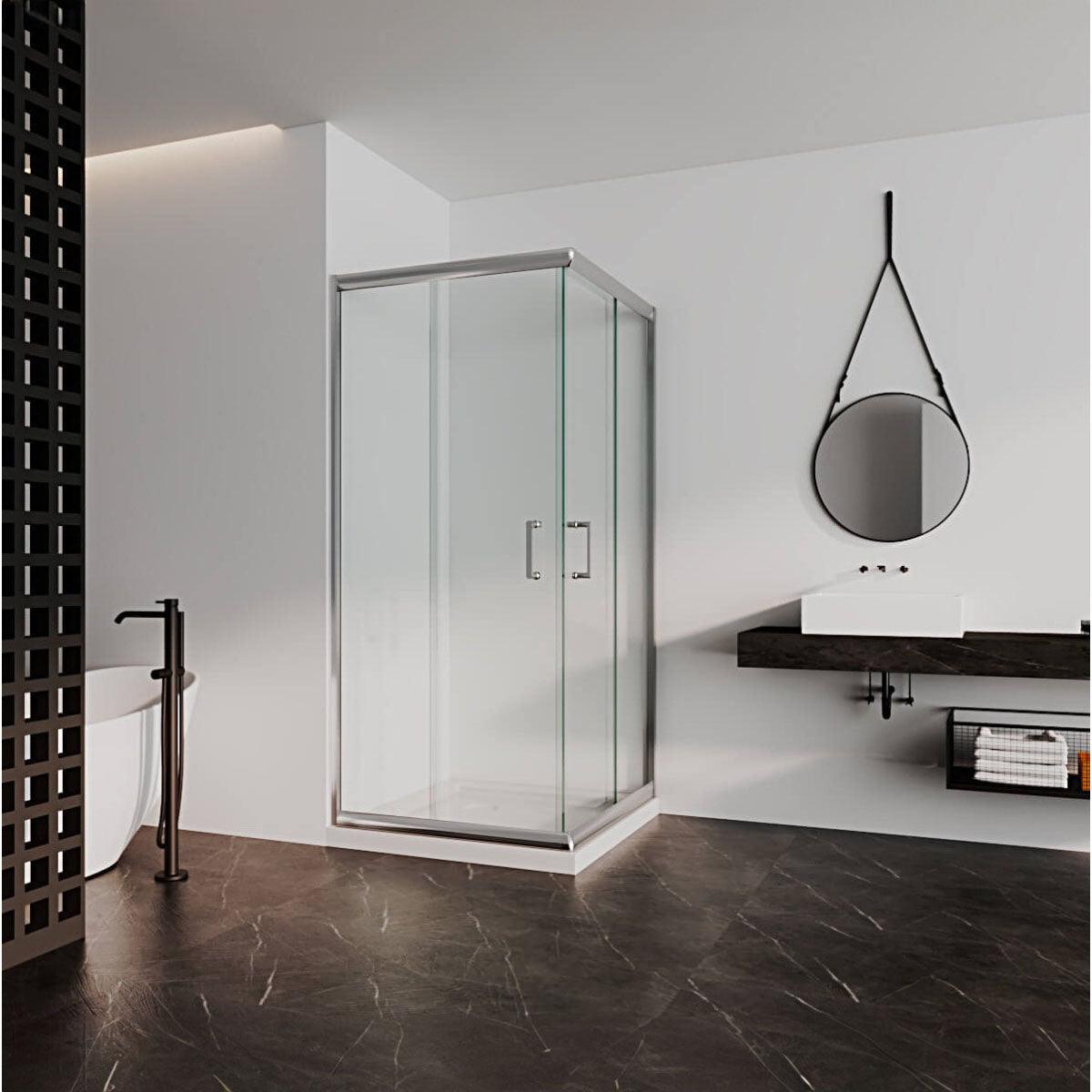
36" x 36" Shower Door Set - Corner Setup with Chrome Hardware and White Base
Glass Options for Shower Doors
When it comes to shower doors, the glass plays a crucial role in both functionality and aesthetics. There are several glass options available, each offering unique benefits and characteristics. Understanding these options will help you make an informed decision that aligns with your personal preferences and practical needs.
- Clear Glass: This is the most common and widely used option for shower doors. Clear glass provides an unobstructed view, making the shower area appear more spacious and open. It's an excellent choice for those who prefer a minimalist and modern look.
- Frosted or Patterned Glass: If you desire more privacy or want to add a touch of elegance to your bathroom, frosted or patterned glass can be an excellent alternative. These types of glass obscure the view while still allowing natural light to pass through, creating a soft and diffused ambiance.
- Tinted Glass: Tinted glass offers a unique and stylish look while also providing privacy and reducing glare. It comes in various shades, such as bronze, gray, or blue, allowing you to complement your bathroom's color scheme or create a desired mood.
- Tempered Glass: Safety is a paramount concern when it comes to shower doors, and tempered glass is the industry standard. This type of glass is heat-treated to increase its strength and durability, making it less likely to shatter into sharp pieces in the event of breakage. Tempered glass is a must-have for any shower door installation.
- Glass Thickness: The thickness of the glass can impact both the aesthetics and durability of your shower door. Thicker glass (typically 3/8 inch or more) is heavier and provides a more substantial, high-end look. However, thinner glass (1/4 inch or less) is lighter and more budget-friendly, but may not offer the same level of durability or soundproofing.
When selecting the glass for your shower door, consider factors such as privacy needs, desired aesthetic, safety requirements, and budget constraints. Additionally, consult with professionals to ensure compliance with local building codes and proper installation techniques.
Hardware and Finish Choices
When selecting a shower door, the hardware and finish options play a crucial role in both functionality and aesthetics. The hardware components, such as rollers, hinges, and handles, determine the door's smooth operation and durability. Additionally, the finish you choose will complement your bathroom's overall design and style.
- Rollers and Hinges: Shower door rollers and hinges are available in various materials, including stainless steel, brass, and plastic. Stainless steel and brass options are typically more durable and long-lasting, while plastic components may be more affordable but less resistant to wear and tear. Ensure that the rollers and hinges you choose are designed for smooth, effortless operation and can support the weight of your shower door.
- Handles and Knobs: Shower door handles and knobs come in a wide range of styles, from sleek and modern to classic and ornate. Popular finish options include chrome, brushed nickel, oil-rubbed bronze, and matte black. Consider the overall aesthetic you want to achieve and choose a finish that complements your bathroom's fixtures and hardware.
- Finishes and Durability: The finish you select for your shower door hardware will not only impact the overall look but also play a role in durability and maintenance. Chrome finishes are popular for their shiny, polished appearance and resistance to tarnishing and corrosion. Brushed nickel and oil-rubbed bronze finishes offer a more muted, warm tone and can be more forgiving when it comes to water spots and fingerprints. Matte black finishes provide a modern, sleek look but may require more frequent cleaning to maintain their appearance.
- Maintenance Considerations: Different finishes and materials require varying levels of maintenance. Chrome and stainless steel finishes are generally low-maintenance and can be easily cleaned with mild soap and water. Brushed nickel and oil-rubbed bronze finishes may require occasional polishing or specialized cleaners to maintain their luster. Avoid abrasive cleaners or harsh chemicals, as they can damage the finish over time.
When choosing hardware and finishes for your shower door, consider not only the aesthetic appeal but also the durability, maintenance requirements, and overall functionality. Selecting high-quality components and finishes can ensure a smooth operation and a long-lasting, beautiful addition to your bathroom.
Style and Design Considerations
When selecting a shower door, it's essential to consider the overall style and design of your bathroom. The shower door should complement the existing decor and create a cohesive, visually appealing space.
Matching Shower Door Style to Bathroom Décor
Analyze the existing color scheme, materials, and design elements in your bathroom. For a traditional or classic bathroom, consider shower doors with a more ornate or decorative frame, such as those with intricate patterns or etched glass. Conversely, a modern or contemporary bathroom may benefit from a sleek, frameless shower door with clean lines and minimal hardware.
Modern vs. Traditional Designs
Modern shower door designs often feature minimalist frames, frameless options, or even sliding barn-door styles. These designs create a seamless, open feel and can make a small bathroom appear more spacious. Traditional designs, on the other hand, may incorporate decorative glass panels, framed doors, or even curved or angled shapes for a more classic look.
Minimalist vs. Ornate Styles
Minimalist shower door styles prioritize simplicity and clean lines, often with frameless or semi-frameless designs. These styles are well-suited for contemporary or modern bathrooms, as they create a sleek and uncluttered appearance. In contrast, ornate shower door styles may feature intricate glass patterns, decorative hardware, or elaborate frames, adding a touch of elegance and sophistication to more traditional or ornate bathroom designs.
Regardless of the style you choose, it's essential to consider how the shower door will visually integrate with the rest of the bathroom's design elements. A well-chosen shower door can enhance the overall aesthetic appeal and create a cohesive, harmonious space.
Maintenance and Care
Proper maintenance and care are essential for keeping your shower door looking pristine and functioning optimally for years to come. Regular cleaning and preventative measures can help avoid unsightly buildup, water stains, and premature wear and tear.
Start by cleaning your shower door after every use with a squeegee or microfiber cloth to remove excess water and prevent water spots. For a deeper clean, use a specialized glass cleaner or a mild solution of warm water and vinegar. Avoid harsh abrasives or acidic cleaners, as these can damage the glass and hardware.
To prevent soap scum and mineral buildup, consider installing a water softener or using a daily shower spray cleaner. These products can help break down residue and make regular cleaning more effortless. Additionally, ensure proper ventilation in your bathroom to reduce moisture and prevent mildew growth.
For the hardware components, such as hinges, handles, and rollers, periodically wipe them down with a soft cloth and a mild detergent solution. Lubricate moving parts as recommended by the manufacturer to ensure smooth operation and prevent premature wear.
If you notice any scratches or chips in the glass, address them promptly to prevent further damage. Minor scratches can often be buffed out with a specialized glass polishing compound, while more significant issues may require professional repair or replacement.
By following these simple maintenance and care steps, you can extend the life of your shower door and keep it looking beautiful for years to come.
Budget and Cost Considerations
When planning to install a shower door, it's essential to understand the various costs involved to make an informed decision that aligns with both your aesthetic desires and budget constraints. Here’s a detailed breakdown of the approximate costs associated with different types of shower doors, materials, and additional factors.
Material Costs:
- Framed Shower Doors: These are generally the most affordable, ranging from $200 to $700. They include a metal frame for added stability, which allows the use of thinner glass.
- Semi-Frameless Doors: These doors cost between $250 and $2,000. They feature minimal metal framing, offering a balance between the sleek look of frameless doors and the stability of framed doors.
- Frameless Shower Doors: These provide a modern, open look and range from $600 to $5,000, depending on the thickness and quality of the glass. Frameless doors require thicker glass, typically 3/8" to 1/2", which drives up the cost.
- Curved and Neo-Angle Doors: Custom curved or neo-angle doors, often used in corner showers, are among the most expensive, starting around $900 and can exceed $3,000 due to their complex installation and custom glass cutting.
Installation Costs:
- Professional Installation: Labor costs vary but generally range from $200 to $1,000. The complexity of the installation can affect the price, with frameless doors requiring more precision and thus higher labor costs.
- DIY Installation: For those handy with tools, installing a framed or semi-frameless door can save on labor costs. However, professional installation is recommended for frameless and custom doors to ensure proper fit and prevent leaks.
Additional Costs:
- Glass Types: The type of glass can significantly affect the price. Standard clear glass is the most affordable, while frosted, tinted, or textured glass like rain or hammered glass can add $15 to $65 per square foot.
- Hardware: The cost of necessary hardware varies. Basic hinges and handles can cost $50 to $200, while premium hardware in finishes like brushed nickel or bronze can increase costs further.
Here’s a table for a clearer comparison on shower doors:
| Type | Cost Range (Material Only) | Installation Cost | Total Estimated Cost |
| Framed Doors | $200 - $700 | $200 - $500 | $400 - $1,200 |
| Semi-Frameless Doors | $250 - $2,000 | $300 - $700 | $550 - $2,700 |
| Frameless Doors | $600 - $5,000 | $500 - $1,000 | $1,100 - $6,000 |
| Curved/Neo-Angle Doors | $900 - $3,000 | $600 - $1,200 | $1,500 - $4,200 |
Long-Term Considerations: While upfront costs are important, consider the long-term maintenance and durability. Higher-end materials and professional installation may cost more initially but can save money over time through reduced maintenance and longer lifespan. For example, frameless doors, though more expensive, typically require fewer replacements of seals and hardware, offering better long-term value.
By thoroughly evaluating these cost considerations, you can make a well-informed decision that meets your functional needs and financial goals, ensuring your investment enhances both the utility and aesthetics of your bathroom.
Conclusion
Choosing the right shower door type and size is crucial for creating a functional and stylish bathroom space. It's essential to strike a balance between practicality and aesthetics, considering factors such as the available space, accessibility needs, and personal design preferences.
When selecting a shower door, remember to measure accurately, account for clearance and swing space, and consider the overall layout of your bathroom. Glass options, hardware finishes, and accessibility features can all contribute to the overall look and functionality of your shower enclosure.
Don't hesitate to consult with professionals or seek expert advice to ensure a seamless installation process and long-lasting durability. Regular maintenance and proper care will also help extend the life of your shower door and keep it looking its best.
Ultimately, the right shower door can enhance the overall ambiance of your bathroom, providing a luxurious and inviting space for your daily routines. By considering all the factors discussed, you can make an informed decision that meets your unique needs and complements your personal style.


